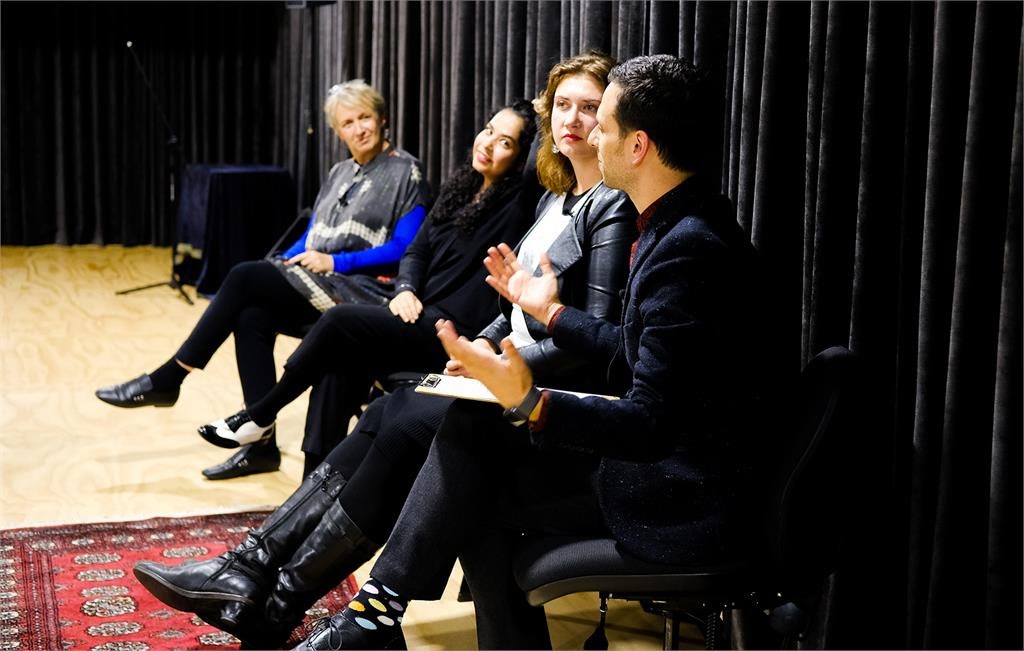Decolonise, decentralise and deartify: NIDA Melbourne talks to the tastemakers
- Written by Lliane Clarke

Who decides what we see? Who decides what we don’t see? How accessible are open access festivals? How do we go beyond satisfying what our audiences expect to see? How do we talk to each other? NIDA brought the Melbourne arts community together last week at a NIDAnights roundtable to talk audience, curating, funding, festivals and fun.
Chairing the event was Simon Abrahams, Creative Director and CEO of Melbourne Fringe Festival, with Head of Participation at Arts Centre Melbourne Angharad Wynne-Jones, Next Wave Creative Producer Erica McCalman and Footscray Community Arts Centre Creative Producer Jasmeet Sahi.
The evening included intense discussion around the current state of the arts in Australia. NIDA also announced the call for expressions of interest for the NIDA Launchpad Residency with Brunswick Mechanics institute, and launched the Autumn | Winter season of NIDAnights.
The discussion ranged from the different approaches each producer and organisation took to curation and programming to the priorities they placed on keeping their programs accessible to the wider communities they serve.
Some highlights include:
Erica McCalman on the processes at Next Wave around reaching an indigenous audience : ‘Aboriginal people are an audience, but they are also so used to being ignored or even arrested when they go near a municipal building. We are testing out a methodology to work in different ways within first nations art, for example with touring theatre productions where we recognise that we work with a community liaison officer. It’s about being clever around who you bring into your organisation as a cultural gatekeeper. This is part of a larger methodology of reaching out to people who you want to have a relationship with, which includes people living with disability or LGBTI audiences. People who may have looked at your marketing and not seen an indication that they were ever invited to the event.’
Angharad Wynne-Jones on the concept of sustaining an audience: ‘The Arts Centre is not a community centre, that’s not how it is positioned. But at the same time when the majority of our audiences are white and middle aged, that’s not sustainable as a business model as that’s not reflective of who we are – 45% of people in Melbourne are born overseas. How do we listen to that reality? What sort of genuine relationships can we develop and how is that reflected in our programs? This is a significant issue particularly for the major cultural institutions. They have come out of a European model and a way of positioning art to an elite and a notion of quality and centralization. The area I am working in is how that shifts and changes. One strategy I am looking at is a small delicate relationship-building process called Our Place – how can we encourage communities who have felt excluded and unwelcome or intimidated and how we might develop a civic space that belongs to everyone.’
Jasmeet Sahi on decolonising content: ‘At Footscray our artists and our audiences are the same people. I think that we have to first look within our own organisations in terms of decolonising the content – who are the people inside the organisation? Who is the producer and who is the marketing coordinator? Unless we do that it is like trying to do plastic surgery on the wound when you haven’t cleaned up the wound itself. I think a producer needs to go to an event and look at the faces of the people there and look at what is being said. And then go back to the audience members and ask them – why did you come? What can we do better? We need to be making artwork that is not isolated from the community.’
Simon Abrahams on the role of cultural democracy : ‘Melbourne Fringe is about celebrating cultural democracy. I mean the idea of art for everyone. And no matter who you are in terms of race, sexuality, disability, political opinion, anyone can make a contribution to the cultural life of our city. We try and find ways to invite people to do that, and lower the barriers of access to enable people to take part and create context where people’s creativity or agency becomes possible.’
Final words from the esteemed panel on the future of tastemaking in our city: Decolonise, Decentralise and Deartify.











